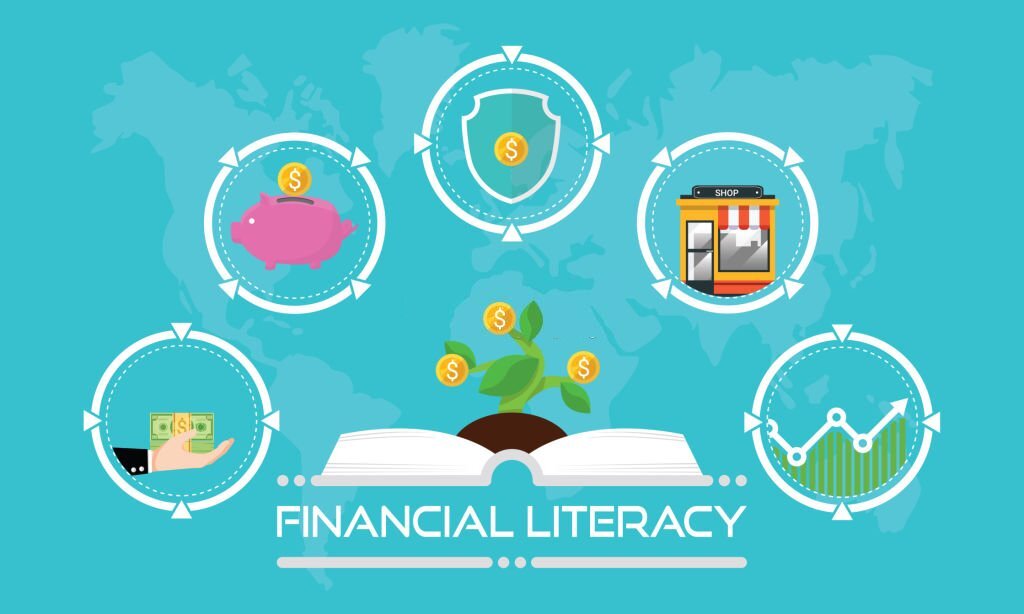Financial literacy is a topic that frequently goes unnoticed in formal schooling in the hustle and bustle of modern life but has significant effects on both our individual and societal well-being. Financial literacy, expressed, is the capacity to comprehend and use different financial abilities, such as investing, budgeting, and personal financial management. But why is it so important for everyone, and how can knowing financial literacy improve one’s life?
Describe Financial Literacy:
The ability to make wise decisions regarding financial resources and the knowledge and understanding of financial ideas are both components of financial literacy. It includes comprehending subjects like:
Budgeting: Making a plan for your income and expenses in order to live within your means and reach your financial objectives is known as budgeting. It entails keeping track of all sources of income and allocating sections of it for debt repayment, savings, investments, and fixed and variable expenses. People who create a budget have a better awareness of their financial condition, which enables them to prioritize their spending, save money wisely, and avoid taking on needless debt. Budgeting essentially acts as a guide to financial security.
1.)Saving: The practice of laying aside some of one’s income or resources rather than using them for immediate consumption is known as saving. This money can be stored in a variety of ways, including as cash, a fixed deposit, or a bank account. Savings are mostly done to maintain financial security and to have money on hand in case of emergencies or future demands. A person can attain long-term financial goals, plan for major expenses, invest in increasing their wealth, and have peace of mind by consistently saving money.
2.)Investing: is the act of allocating resources, usually money, with the hope of making a profit or an income. It entails investing money in assets like stocks, bonds, properties, or businesses in the hopes that these assets will appreciate over time. A great way to increase wealth and meet long-term financial objectives is by investing. Individuals may maximize profits and contribute to their financial security and future by being aware of the dangers and making educated decisions.
3.)Debt management: The approaches people use to manage their outstanding obligations are referred to as debt management. The objective is to reduce or eliminate debts while averting further financial difficulties efficiently. Maintaining good credit, lowering stress from financial responsibilities, and achieving long-term financial stability are all benefits of effective debt management. It frequently entails formulating a structured repayment plan, negotiating with creditors, combining several debts into one payment, and enlisting the help of credit counseling organizations. A debt-free future can be achieved by setting priorities and approaching bills carefully.
4.)Insurance: An insurance policy is a type of financial arrangement created to safeguard against monetary loss or danger. An insurance firm receives a premium from people or organizations in return for a promise of payment or coverage in the event of particular unanticipated events or damages. Health, life, auto, property, and liability insurance are common forms of protection. Insurance protects people and organizations from potential substantial financial burdens by distributing the risk across many policyholders.
5.)Retirement Planning: The process of identifying retirement income objectives and the necessary steps and choices to reach those goals is referred to as retirement planning. It entails assessing several financial strategies and making plans for upcoming expenses in order to guarantee that a person has a reliable source of income in their later years when they are no longer employed. Saving, investing, comprehending prospective retirement benefits like pensions or Social Security, and managing assets are essential components of retirement planning. The main goal is to become financially independent and to guarantee a comfortable standard of living in retirement. A person can retire with confidence if they have done their retirement planning well since they will be ready for any financial obstacles that may occur during their golden years.
6.)Tax Management: The systematic method used by both people and corporations to ensure that their tax obligations are met within the bounds of the law and that their tax burden is kept to a minimum is known as tax management. Understanding tax laws, using permitted deductions and credits, budgeting to take advantage of tax benefits, and making sure tax returns are filed on time and accurately are all part of this. Effective tax management is essential to both personal and business finances since it not only ensures compliance but also has the potential to save a lot of money.
These are only a handful of the areas that financial literacy includes. The ability to successfully negotiate life’s financial landscape is what it means to be financially literate.
Exactly Why Is Financial Literacy Crucial?
Let’s explore the significance of financial literacy now that we know what it entails.
1.)Independence and Empowerment: When people are aware of their financial situation, they are better able to make choices that are in line with their objectives. It entails having enough money to start a business, save for college, or even purchase a home. Financially literate people are better able to realize their dreams.
2.)Avoiding Financial Pitfalls: Without a firm understanding of financial fundamentals, people are more likely to commit errors like amassing excessive debt or becoming victims of financial scams. In this area, knowledge certainly is power.
3.)Achieving Financial Security: People who know how to manage their finances well can create a solid foundation for their families and themselves. It may result in a relaxed retirement, the capacity to support loved ones, and the potential to leave a lasting legacy.
4.)Economic Vitality: At the macro level, a community’s or country’s economy depends on its citizens being financially literate. Making wise choices when it comes to borrowing, investing, and saving can help to create a more stable economic climate.
5.)Stress Reduction: Financial difficulties are a major source of anxiety and stress. Better mental and emotional health can result from financial knowledge and proactivity.
6.)Increasing Generational Wealth: Financial literacy goes beyond individual gain. Financial literacy enables people to transmit their knowledge to the following generation, leaving a legacy of sound money management.
How Can Financial Literacy Be Promoted?
It is obvious how important financial literacy is, but how can we make sure that everyone has access to this vital information?
1.)Start Early: Financial literacy training needs to start early. Schools can incorporate fundamental financial ideas into their curricula to guarantee that students finish with a fundamental knowledge of how money functions.
2.)Lifelong Learning: Financial literacy is a lifelong skill that requires ongoing learning. Our expertise should change as the financial environment does. Regular lectures, courses, and workshops can aid in educating the populace.
3.)Utilise Technology: We now have access to a multitude of knowledge thanks to the development of apps, internet platforms, and digital resources. These resources can improve accessibility and interest in financial education.
4.)Community Programmes: Nearby libraries, community centers, and nonprofit organizations can provide classes or other resources for people at all phases of life, from purchasing a first home to making retirement plans.
5.)Personal accountability: Although external resources are essential, people, too, have a part to play. The key is to take the initiative to educate yourself and look for knowledge.
As a result,
Understanding financial topics that have a significant impact on one’s quality of life requires more than just a mathematical understanding of numbers. Financial literacy has advantages for everyone, from the assurance that comes with financial security to the empowerment of attaining one’s objectives.
Let’s prioritize financial education as we move forward in an increasingly complex financial environment, mindful of its significant effects on the individual, local community, and global levels. Remember that financial literacy is a tool that can open doors, generate opportunities, and pave the way for a brighter future for everybody, whether you’re just beginning your financial journey or looking to enhance your knowledge.





